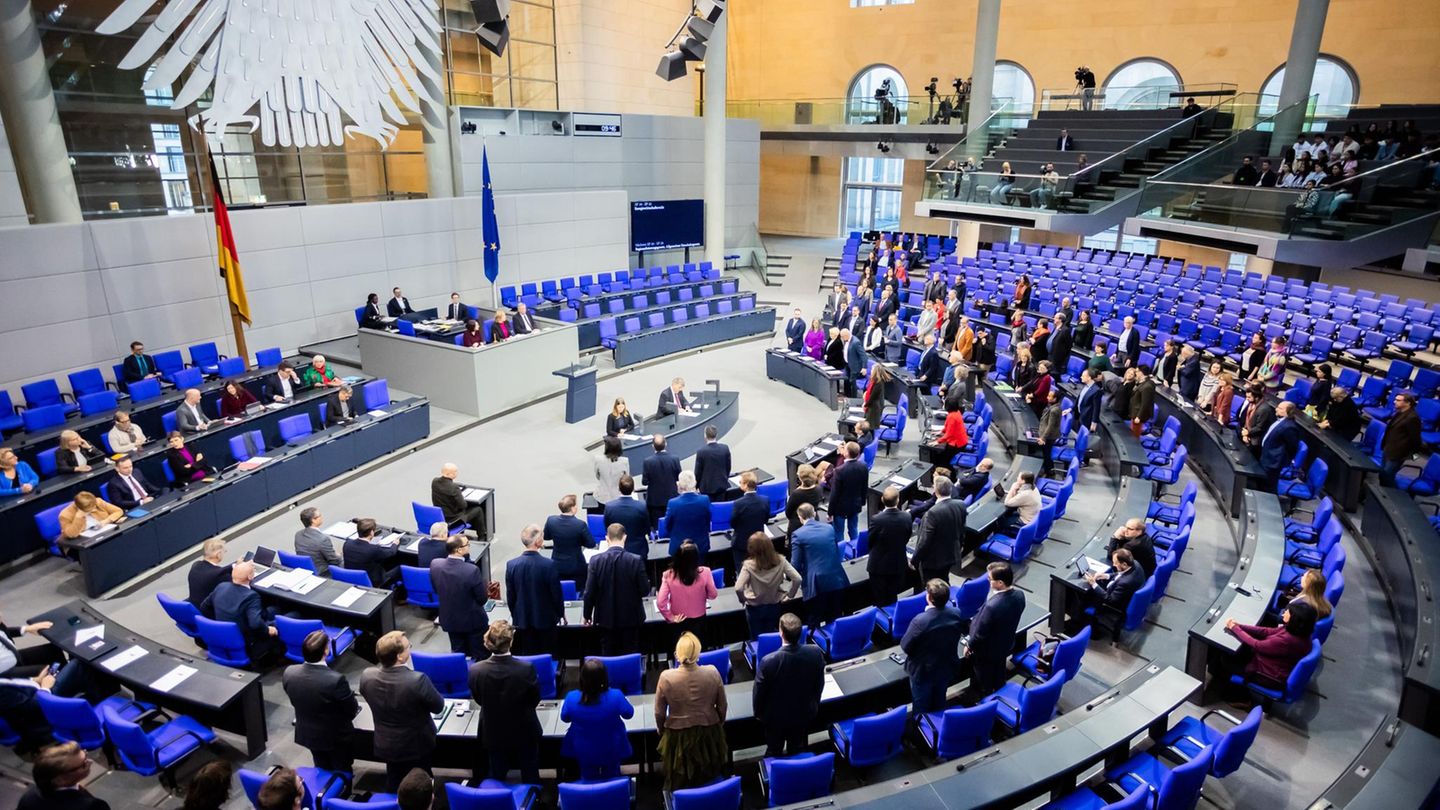Copy the current link
The Union wants to have a law in the Bundestag voted that could get a majority with votes from the AfD. Why this taboo break in the federal government is delicate – and what happens afterwards.
Politicians have recently given the country a few extraordinary weeks. Among other things, a government has broken, early new elections had to be applied. This week, however, there is a special heaviness above the Berlin government district: Is a law passed for the first time in the Bundestag that also owes its majority to the votes of the AfD?
After the murders of Aschaffenburg, CDU Chancellor candidate Friedrich Merz searched the offensive and announced a tough course in migration policy. On Wednesday, two applications in the plenum are to be voted on, among other things, “permanent border controls” to the neighboring countries are required, as well as the “rejection without exception of all experiments of illegal entry”. However, it is not yet possible whether the Sahra Wagenknecht alliance will agree to these applications. However, the BSW has signaled approval for the vote on Friday about the so -called influx limitation law, as well as the FDP – and the AfD.
Why is that so delicate?
This Friday could be a historical day. If the Union enforces the so -called influx limitation law with a majority of AfD, FDP and BSW, a taboo would be broken in the federal government. For the first time, the Bundestag would have decided a law that could only be passed with the help of the AfD.
The political pressure wave would be huge, as would international attention. Because such a result of a vote would be at least for a turning point in the parliamentary in several ways. And the election campaign in Germany is also likely to increase hardness. The focus of the discussion would then put the question of whether the fire wall between the Union and the AfD, the candidate for Chancellor Friedrich Merz even connected to his political fate, would falter – or would have already collapsed.
There have already been majorities with the AfD in the state parliaments of Saxony and Thuringia. In Dresden it was the occupation of committees, in Thuringia the CDU, FDP and AfD chose a prime minister four years ago that resigned after a few days. These parties also decide a law to reform the real estate transfer tax.
However, all political groups have previously avoided any cooperation with the AfD in the federal government. In countless attempts with different candidates, the right -wing populists did not even receive the majority for the occupation of the position of a Bundestag Vice President who are actually entitled to.
It is thanks to the failure of the traffic light coalition that there is now a chance of a majority for the law. Since then there have been no fixed majorities in the Bundestag. The Union now argues that it is not looking for cooperation with the AfD, but only puts it to vote what it thinks is the right policy. But it would not be a purely random majority after AfD, FDP and BSW have already announced their approval in advance.
If the AfD, of all things, formed a majority with the Union in migration policy, it would also be the greatest possible success of the right -wing populists, whom immigration since Angela Merkel’s decision in 2015 not to close the borders for Syrian refugees, was a kind of life elixir.
What is there?
With the “Law to limit the illegal influx of third -country nationals”, the Union is concerned with a reduction in illegal migration to Germany. In the Residence Act, as the goal, she wants to fix the “limitation” again and not just the “control” of illegal migration. The so -called influx limitation law also provides for family reunification for people with limited protection status. In addition, the federal police should receive more powers: if they pick up people without valid documents, they should be able to apply for imprisonment or custody to secure the deportation itself. In the case of the legal situation on border controls and rejections, the law does not provide any changes – these are already possible on the basis of the applicable law, the Union argues in its draft law, “so that no legal changes are required in this respect”.
In September 2024, the law was referred to the committees after the first reading in the common procedure for advice. The design then failed in the committee for the Interior and Home. SPD, Greens, FDP and Linke rejected him – that day in November, on which the traffic light government was supposed to break at a later hour. Actually, the law for the subsequent day in the Bundestag was intended to vote, where it would have been rejected with the majority of government. This did not occur due to the break of the government. The Union now wants to catch up on this final vote on the law on Friday.
How is the mood in the Union?
Friedrich Merz forces the entire party to his line. The vast majority of the party seems to be behind her candidate for chancellor, in his appearances he is cheered, in terms of content anyway, but also the intention to vote with the AfD if necessary, there is a lot of encouragement. Even in the liberal camp, there is no loud criticism, with the exception of the internal opposites of Schleswig-Holstein head of state Daniel Günther.
His educational minister and vice boss of the CDU, Karin Prien, also a liberal representative, is demonstratively next to the party leader: “I am on the side of Friedrich Merz,” said Prien the star. It is now about a directional decision for democracy: “Only if a center-right party like the CDU receives the migration problem in Germany, this can avert the erosion of our democracy and the rise of radical forces.” Very clear steps.
Behind the scenes, however, there is already criticism of the Chancellor’s candidate here and there: With his applications, he has negotiated the party without a need. A balancing hike is talked about, a dance on knife cutting edge. Only: there is no longer a back now. That seems clear to everyone-the Merz supporters and his opponents in the party. Especially in the countries in which the Union rules, you look at the debate and its consequences, especially for the time after the election. So far, it has been completely unclear which corridor damage Merz ‘rabid approach is – and what successes can ultimately be achieved.
At the parliamentary group meeting on Tuesday, Merz said: “I want people with their feelings in the democratic middle.” A “harder gait” in migration policy is now needed. MP Andrea Lindholz once again described the consequences of the crime in her constituency in Aschaffenburg. Members are said to have had tears in their eyes.
How does the Chancellor’s party react?
With loud outrage – and the quiet hope of being able to benefit from the Union’s dilemma. In the Merz maneuver, the Social Democrats sense an opportunity to revive two of their central motifs in the slowly running election campaign. One motif shows the CDU boss as a player nature, which is already candidate For the Chancellery, a “taboo break” risk – what would only be from one Chancellor To expect Merz? And the other motif is that of the Scholz-SPD, which, on the other hand, is stable and fundamentally resistant.
A video clip is shared among SPD MPs, which is supposed to convict Merz of the broken word. It dates from the time after the traffic light break. In it, the CDU boss suggests an “appointment” between the Union and Red-Green to only make decisions on the agenda of the Bundestag, which one had previously agreed “in the matter”. Merz ‘goal: that with no voting in parliament “even once a random or actual majority comes about with them.” The AfD is meant.
That was shortly after the traffic lights-and thus before the attack by Magdeburg, in front of the murders of Aschaffenburg, the turning point in this election campaign. Also from the point of view of the SPD. Considered from the cutting asylum plans of the CDU boss, the SPD party executive decided on Monday to counter a position paper to counter the impression of just rumbling against the Union plans, but remaining in action. On Wednesday, Chancellor Olaf Scholz plans to submit a government declaration in Bavaria after the act of violence.
What is the AfD calculation?
For the AfD it is a week of triumph, but also caution. First of all, the AfD can feel strengthened: the Union takes over central positions in refugee policy from it and, at least indirectly, relies on common majorities with it. This is not an active collaboration, as similar votes in the Thuringian state parliament showed in 2023.
But the so -called fire wall no longer looks really stable, especially since the fall height at the federal level is significantly larger. The normalization of the AfD is therefore taking a large, possibly historical step ahead before the Bundestag election. The party can bring in additional votes in the civil-conservative milieu.
However, the other way around for the AfD: precisely because the Union now occupies its central migration topic in a similar way, a danger for the right -wing party is also growing. In the election campaign, it will describe herself as the more radical original. But Friedrich Merz’s offensive strategy could be successful, especially for alternating voters.
This ambivalence is probably aware of the party leadership. But she apparently decided. Even if the Union of the AfD explicitly accuses of “fueling xenophobia and putting conspiracy theories in circulation”, the tendency is clearly to be approved. AfD boss Tino Chrupalla put it this way: The AfD would “not fall for such skirmishes”.
What happens when the law gets through?
At first probably not that much. The law would have to pass the Federal Council at least in parts. According to the situation, it has little chance there, because in addition to Bavaria, either the Greens or SPD are involved in all state governments – and they should put their veto everywhere. Nevertheless, the maneuver would probably determine the rest of the election campaign on Friday. Both sides, red-green as well as the Union and FDP, could use it to mobilize your own people.
The increasing polarization would also have an effect for the time after the election. A law adopted in the Bundestag could give Merz an argument in the event of an election victory to declare his asylum course as non -negotiating. It would make it all the more difficult for its opponents to meet the CDU boss. In short: Due to Friday, the foreseeable complicated coalition formation should be made more difficult again after the election.
Source: Stern
I have been working in the news industry for over 6 years, first as a reporter and now as an editor. I have covered politics extensively, and my work has appeared in major newspapers and online news outlets around the world. In addition to my writing, I also contribute regularly to 24 Hours World.







